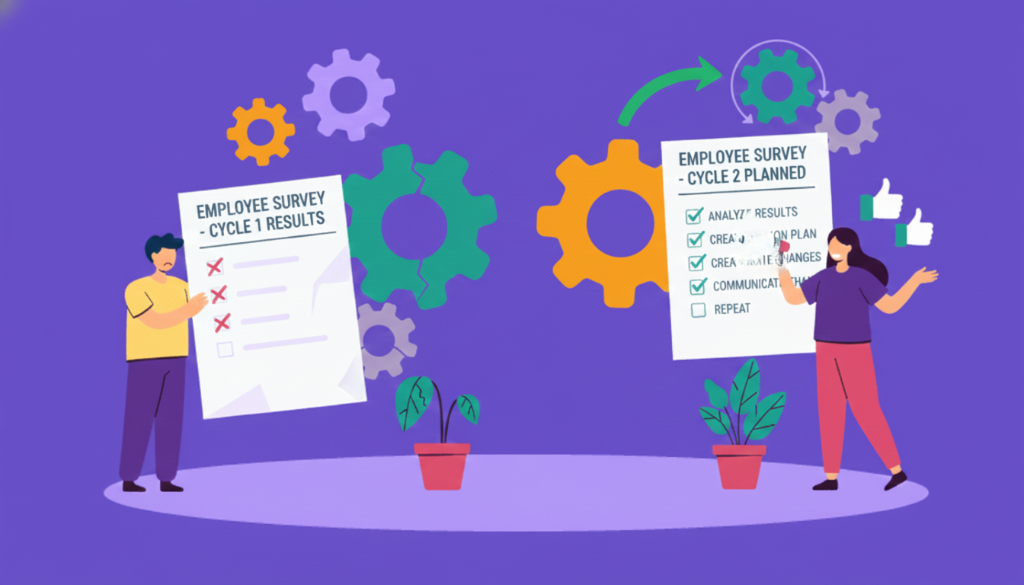Top 25 Survey Incentive Ideas To Reward Participants for Better Insights

A Global Employee Recognition and Wellness Platform
In today's corporate landscape, data is the new currency—driving decisions, strategies, and outcomes across every department. Nowhere is this more evident and visible than in employee engagement. Just as companies use data to refine products or optimize marketing campaigns, they can leverage employee engagement data to fuel innovation, strengthen culture, and boost performance.
However, collecting this invaluable data often comes with challenges. Getting employees to actively participate in surveys can be an uphill battle. Some may feel disengaged, uncertain about the survey’s impact, or simply overwhelmed by their workload. This makes gathering enough feedback for actionable insights a real struggle for HR teams and leadership.
But how do you encourage employees to actively participate in these surveys? The answer lies in offering the right survey incentives. Just like fueling a high-performance engine, meaningful rewards motivate employees to provide honest feedback.
This blog will take you through what survey incentives are and give you a wide list of ideas to help you sail through the process.
Key Takeaways
- What are Survey Incentives
- What are the various monetary incentive ideas
- What are the various non-monetary incentive ideas
- What are other incentive ideas
What are Survey Incentives?
Survey incentives are rewards or compensation offered to employees for participating in a survey . These incentives serve as a motivation for people to take the time to complete surveys, providing valuable feedback and data to the organization conducting the research.
An incentive is a bullet, a key: an often tiny object with astonishing power to change a situation.
– Steven Levitt
Cited by PeoplePulse, John Towler, a Psychologist and Senior Partner of Creative Organizational Design, commented:
“Incentives can increase survey response rates dramatically. Our experience has shown that offering a worthwhile incentive can entice up to 50% of the people who would not normally complete the survey, to finish it and send it in. This applies to both paper and pencil surveys and ones that are presented on the Internet.”
Why Do We Need to Incentivize Surveys?
Surveys are vital tools for gathering feedback, but encouraging meaningful participation can be challenging. Offering incentives is one way to bridge this gap, motivating respondents to give their time and effort to provide valuable insights. Incentivizing surveys is a reciprocal effort, where both the company and the employees benefit. When employees take the time to share their honest feedback, the company must also give something in return to show appreciation.
However, it’s essential to remember that surveys should never be used as coercive tactics. The goal is not to pressure respondents into completing a survey or nudging them toward certain answers, but to create an environment where they feel valued for their participation. Incentives should serve as a motivator, not a manipulative tool, allowing employees to provide genuine, unbiased feedback.
Here’s why offering incentives in surveys is important:
Increase Participation Rates
A reward can give people the extra motivation they need to complete a task. Research shows that offering a monetary incentive can increase participation by up to 25%.
Enhance Data Quality
When people feel motivated to engage, they tend to provide more thoughtful and detailed responses. According to a study offering an incentive, like a $10 reward—increases the likelihood of participants answering questions fully, without sacrificing the quality of the data.
Encourage a Diverse Range of Responses
Without incentives, some groups, especially those less engaged or harder to reach, may skip over surveys. Offering rewards helps to motivate a broader audience to participate, ensuring that the feedback you collect comes from a wide range of perspectives. This diversity of responses ensures that your data is more representative and reliable.
Acknowledge Time and Effort
Completing a survey, especially a lengthy or complex one, takes time and focus. Incentives recognize and reciprocate the effort employees put in. When employees see that their time is valued, they’re more likely to participate fully and provide thoughtful answers. It’s a simple but powerful exchange, employees give their time, and the company gives something back.
Overcome Survey Fatigue
We’re all familiar with survey fatigue—those endless requests for feedback that can overwhelm participants. Offering incentives helps your survey stand out in the crowd, especially when people are already fatigued from filling out multiple other forms.
Build Positive Organizational Perception
Offering incentives can create goodwill and foster positive relations with participants. When people feel their time and opinions are valued, they’re more likely to engage with future surveys, creating an ongoing feedback loop that benefits both the organization and the respondents.
Accelerate Data Collection
Incentives also encourage quicker responses, which is essential when there are tight deadlines for gathering survey data. Motivated participants tend to complete surveys faster, allowing organizations to gather insights quickly and efficiently.
Types of Survey Incentives
Incentives can be divided into two main categories:
Monetary Incentives Ideas
Monetary incentives are those powerful motivators that provide employees with tangible rewards for their efforts. There are a range of effective incentive ideas that can fetch you your desired outcome.
Based on research by BMC Medical Research Methodology, a $10 monetary incentive offer effectively increased Wave 4 response rates. In addition, the $10 incentive offer was more effective in encouraging initially reluctant participants to respond to the survey.
1. Cash Rewards
You can directly offer cash rewards to your employees for participating in surveys. It cannot be denied that cash is the universally accepted incentive, giving employees the flexibility to use it when deemed fit. Hence, its importance can generate the required motivation to undertake surveys.
2. Reward Points
Implementing a reward point system will also help you boost survey participation. In this type of incentive, employees receive points for participating in surveys. Reward points are typically used as currency in rewards and recognition programs. The points can be redeemed for rewards like gift cards or customized experiences. The accumulation of points serves as a motivator for employees to undertake surveys.
3. Gift Cards
Offer participants a range of gift cards from popular retailers and online platforms. Gift cards are interesting incentives that allow employees to choose items or experiences that are attuned to their preferences.
4. Discount Coupons and Vouchers
Offer discount coupons and vouchers for a range of products and services as survey incentives. This includes travel vouchers for airlines, hotels, or travel agencies to fulfill employees' travel opportunities. Additionally, provide shopping vouchers for specific stores, unlocking a personalized shopping spree that caters to their preferences.
5. Charitable Donations
You can offer employees the option to choose a charity for a donation made on their behalf. This incentive is especially appealing to those interested in supporting philanthropic causes
6. Membership Subscriptions
In an era where content is ruling the digital platforms, providing subscriptions to services like Netflix, Spotify, etc, can be a popular choice for employee incentives. This will give them membership access to unlimited content that caters to their entertainment requirements. As a result, it enhances their lifestyle and the choices they make.
7. Stock Options
You can offer company stock as a long-term incentive. This will assist employees in gaining a share in the company’s success. As a result, they will align their interests with organizational growth.
8. Team Lunch
Sponsor team lunches and outings. It helps cultivate camaraderie and strengthen team bonds, contributing to a positive workplace culture.
9. Special Savings Account Contributions
Take the lead in contributing to a savings or retirement account. This incentive will promote financial planning and long-term security for your employees.
10. Gas Cards
Providing gas cards as incentives will be a helping hand for employees who commute longer distances. This eases the financial burden incurred due to transportation costs, especially for those who totally rely on commuting.
Non-Monetary Incentives
Monetary incentives are not the only ones that motivate survey participation. Non-monetary incentives also have their fair share of charms that can unlock motivation in employees to undertake surveys. Let us explore those effective ideas in the following section:
Research on non-cash rewards has figured that organizations should consider such incentives over fiscal ones, especially during downturns in the economy, to boost employee morale and productivity.
11. Flexible Work Hours
You can offer flexibility to your employees, allowing them to set their own working hours within certain limits. This sense of autonomy makes them prioritize their preferences, striking a work-life balance. Also, make remote working a feasible option to promote flexibility.
12. Employee Recognition
Be consistent in ensuring recognition or appreciation for the initiatives your employees take towards participating in surveys. This form of incentive not only encourages them to undertake surveys but also boosts their morale and ignites them to engage with the company’s interests.
13. Reserved Parking Spaces
Allocating preferred parking spaces to employees is another interesting non-monetary incentive. Given the challenges and limitations in parking areas, this incentive offers convenience for regular riders, making parking hassle-free.
14. Timely Breaks
Timely breaks are essential for every working individual. And allowing employees the flexibility to take breaks is a suitable incentive. Breaks help them enhance their focus level and productivity.
15. Tickets to Events
Sponsoring tickets to sports, music, or cultural events is a great incentive to encourage survey participation. This type of experience is enjoyable for employees because it gives them the opportunity to take a break from their routine.
16. Book Club Membership
A book club membership stands out as the best incentive for avid readers. This allows employees to develop a sense of community and ignite intellectual engagement among them.
17. Flexible Leave Policies
Make sure to develop flexible leave policies by reducing restrictions. This form of incentive acts as a driving force for employees to undertake survey participation. Additionally, it allows them to unleash their freedom and acknowledge the importance of rest and personal time.
18. Sweepstakes
Entering participants into a sweepstakes for a chance to win a larger prize, such as an electronic device, vacation, or other popular items can be an engaging non-monetary incentive. Sweepstakes create excitement, while still maintaining a sense of fairness as everyone has an equal chance to win.
19. Office Decor Budget
Every employee loves to decorate their workspace, giving a personal touch to it. You can aid them in personalizing their workspace by assigning a budget for office decor items like plants, artwork, and desk accessories. This incentive works best for motivating them to undertake surveys.
Other Survey Incentive Ideas
Apart from the monetary and non-monetary incentives, you can look further for additional ideas. The following section will discuss other incentive ideas:
20. Team Celebration Event
One of the best incentives to encourage survey participation is to make it result-oriented. You can announce organizing a team celebration event or an outing for departments that showcase higher survey participation rates.
21. Wellness Day Vouchers
You can provide vouchers for wellness activities such as fitness classes, yoga sessions, spa days, or health screenings. Employees who are more wellness-driven will be elated to receive such an incentive.
22. Company Swag
Offer branded merchandise like t-shirts, mugs, or notebooks. These can be both appealing and cost-effective, while also promoting your brand.
23. Employee-led Workshop Day
Allow employees to lead a workshop or training session. Employees who take a keen interest in sharing their knowledge, helping their co-workers, and are confident enough to present themselves will find this tempting. This empowers employees to share their expertise and promotes collaboration and skill-sharing within the organization.
24. Sustainability Initiatives
You can undertake and support a sustainability project in your employees' name. There may be a bunch of employees who are concerned about promoting sustainability. Hence, this can be a suitable incentive for them. Also, this will help you align with eco-friendly values, contribute to environmental sustainability, and showcase corporate responsibility.
25. Giveaways
Giveaways are another interesting way of attracting your employees to survey participation. You can either give away monetary or non-monetary freebies by assuring them that every respondent is in store for something special.
The Pros and Cons of Survey Incentives
Incentives can play a significant role in survey participation, boosting response rates and ensuring a broader pool of feedback. However, they come with their own set of challenges. Let's weigh the pros and cons of offering incentives for surveys.
Pros of Survey Incentives
Encourage Survey Completion
Incentives can be a powerful driver in boosting survey participation rates. Researchresults show it will typically lift response rates by 10-15%. Incentives give respondents a tangible reason to take time out of their day to complete the survey, especially when their engagement might otherwise be low. This is particularly useful for long surveys or when surveying groups that might be less inclined to participate without added motivation.
Motivate Participants in the Final Push
Incentives are also highly effective for encouraging survey completions during the final stages of data collection. By offering a reward to the last set of respondents or running a special promotion, you can reignite interest and drive a burst of responses. This is particularly valuable when you need a few more responses to meet your target sample size or deadline. Studies suggest that introducing incentives late in the survey period can increase overall response rates by up to 50% (BioMed Central).
Cons of Survey Incentives
Attracting Reward Seekers
One downside to offering incentives is the potential to attract respondents who are only interested in the reward rather than genuinely participating in the survey. This can lead to low-quality responses as participants may rush through the survey to claim the incentive, providing less thoughtful or inaccurate answers. According to research, up to 18% of respondents in incentivized surveys may only be participating for the prize, rather than contributing useful data (BioMed Central).
Skewed Survey Results
Incentives may introduce bias into your data if participants alter their responses to increase their chances of receiving a reward. For instance, in lottery-based incentives, some respondents might provide answers they believe are more likely to qualify them for the prize. This behavior can distort the survey results, leading to inaccurate data.
More Difficult to Track Responses
Offering incentives also adds complexity to survey management. Tracking who has completed the survey, distributing rewards fairly, and ensuring no duplicate responses can create logistical challenges. Issues such as multiple entries or attempts to game the system are more common when incentives are involved. This may require additional resources and effort to ensure accurate data collection and reward distribution
Best Survey Incentive Value
Finding the right balance between the value of the incentive and the effort required to complete the survey is crucial. Research from InMoment indicates that prepaid incentives (such as a $1 upfront reward) can improve response rates by as much as 19%, as they build an immediate sense of reciprocity.
Guidance on setting the right incentive value:
-
Consider the time and effort required to complete the survey
-
Impact of Incentives on Data Quality
-
Consider the time and effort required to complete the survey
-
Research industry standards for similar surveys
-
Factor in your budget and the number of responses needed
-
Test different incentive values with small sample groups
-
For monetary incentives, a general rule of thumb:
-
Short surveys (5-10 minutes): $1 to $5
-
Medium surveys (11-20 minutes): $5 to $15
-
Long surveys (20+ minutes): $15 to $50 or more
-
For prize draws, ensure the prize value and odds are attractive
-
Remember that higher values don't always yield better results
-
Consider the diminishing returns of increasing incentive value
Strategies for Effective Use of Survey Incentives
-
Carefully consider the type and value of incentives to ensure they're appropriate for your target audience and survey length
-
Use a mix of immediate and delayed incentives (e.g., small immediate reward plus entry into a larger prize draw) to balance completion rates with data quality
-
Implement quality control measures to identify and filter out low-quality or fraudulent responses
-
Be transparent about the incentive process to build trust with participants
-
Consider using non-monetary incentives that align with your organization's mission or the survey's purpose
-
Regularly evaluate the impact of incentives on response rates, data quality, and overall survey costs to optimize your approach
Conclusion
Thus, survey incentives are a highly effective way to increase participation and gather valuable insights, but their use requires careful planning. By selecting the right type of incentive and considering the timing and value, organizations can strike a balance between motivating respondents and preserving data quality. When managed thoughtfully, incentives can not only boost response rates but also ensure that the data collected is meaningful and actionable for decision-making.
FAQs
Are there budget-friendly incentive options for small organizations?
Yes, budget-friendly options for small businesses can include casual dress days, recognition programs, extra break time, etc.
Can survey incentives be customized based on employee preferences?
Yes. Customizing incentives based on employee preferences will ensure they find the rewards meaningful. As a result, it will increase the overall effectiveness of the incentive program.



















